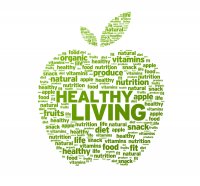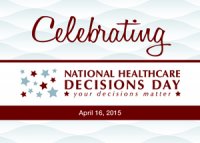Nurture Yourself - Body, Mind, Soul and Spirit
By Kris Powers | January 5th 2016Here are some tips to improve physical, mental, emotional and spiritual health – all of which are required to maintain a healthy, happy you!
Taking care of Older Family Members this Season
By Kris Powers | December 21st 2015We can learn something from anyone at any time. A two year old learns by watching her five year old sister jump and skip. A ten year old boy learns how to shoot a basketball from a neighbor. A grandmother learns how to operate an iPad from her grandson, and so on. Wisdom isn’t always imparted from the older to the younger. The holidays provide a wonderful opportunity for young and old to get together, share stores, and learn from one another. Take advantage of this time together!
How to Deal with Holiday Stress
By Kris Powers | November 25th 2015The holidays, while often a joyful time, can be a source of stress for many, and can bring on feelings of depression and even loneliness for others.
Below are some tips to help make the holidays a little easier.
Do something good for others
The holiday season offers many opportunities to focus on others. Make a donation of money or time to your favorite charity, take a meal to a family who may need one, shovel someone’s driveway, etc.
Laugh
Individuals with a sense of humor tend to have a higher self-esteem. They are also more likely to develop close, social relationships, which can help them deal with stress. Laughing can reduce muscle tension, increase the flow of oxygen to the blood, exercise the heart, and produce endorphins (naturally produced body chemicals that increase a sense of well-being and euphoria).
Say No
A Life Without Headaches: Prevention Tips
By Anonymous | June 9th 2015The most common place for pain to occur in the body is in the head. Two such pains are known as headaches and migraines. Headaches and migraines are a misery and often affects our daily life and tasks such as our job and family responsibilities. They arise from pain triggered in the head or upper neck of the body which affects the tissues surrounding the brain. Some can be severe, but it is very rare that headaches or migraines are caused by something serious.
There are many types of headaches that fall into two categories. The first category is “Primary,” and the second category is “Secondary.” Pretty straightforward right? The primary category includes headaches such as migraines, tension-types, and clusters. The secondary category includes headaches that are caused by infection, diseases, injuries, or medications.
Taking Control: Being Healthy with a Busy Schedule
By Anonymous | May 26th 2015Between family and work obligations, many of us make that same excuse that we don’t have time to be and stay healthy because we are just too busy, overworked or overstressed. With such a busy lifestyle, we don’t realize how damaging this lifestyle can be to our long-term health. Finding time for ourselves or even just to relax is now seen as a luxury that many of us can’t afford to get.
Seven Benefits of Taking a Vacation
By Kris Powers | May 19th 2015Are you planning on taking vacation time this summer? If not, you will be among the 75% of Americans who fail to take all the paid vacation they are due each year. In a poll of 2,300 workers who get paid vacation, the career website Glassdoor found that only 25% of workers said they use all their paid days each year and 61% said that they continue to work even while they’re on vacation.
"Rest, relaxation, and stress reduction are very important for people's well-being and health. This can be accomplished through daily activities, such as exercise and meditation, but vacation is an important part of this as well," said primary care physician Natasha Withers from One Medical Group in New York.
Here are seven ways vacation can be beneficial for you:
B4Stage4 Mental Health Awareness Month
By Kris Powers | May 12th 2015May is Mental Health Awareness Month. According to the National Institute of Mental Health, each year over 60 million Americans experience some form of mental illness. That’s one in four adults! Millions more are touched by mental illness in the lives of family, friends and loved ones. Mental health awareness month serves to highlight the important issues: to improve access to treatment, to fight the stigma around mental health, to provide support, to educate the public and to advocate for equal care.
What are your training goals?
By Anonymous | April 28th 2015Every organization and agency have goals to meet. Whether short-term or long-term, goals are essential in keeping employees and members of an organization encouraged and motivated. Apart from an organization’s overall goals, there is also training goals. Although training can be costly and time-consuming, it provides long-term benefits and having training goals can help you meet those benefits. These long-term benefits may include the decrease in employee turnover rate, overall growth and development, maintenance of permanent employees, and increase employee improvement and retention.
When creating training goals, we always want to make sure that the goals are realistic and measurable. If we want the right training program, we must remember to be SMART. SMART is an easy and effective way to assist you in creating your training goals.
S – Specific
Open the Conversation and Start Advance Care Planning
By Anonymous | April 16th 2015We live in a world that is constantly developing and growing with new technologies, discoveries, and places to see. Because of this, it has become our human nature to want to experience everything and see for ourselves what the future has to bring. Realistically, many of us won’t. Many of us are afraid to leave this world one day and lose everything we have earned especially family and friends.
But, we must come to the realization that life can bring unexpected situations that we may not be prepared for. However, what if we can be prepared? April 16 is National Healthcare Decisions Day that exist to inspire, educate, and empower the public and providers about the importance of advance care planning.
Become a Mental Health Technician
By Kris Powers | March 17th 2015Mental Health Technicians work with mentally, developmentally, or emotionally impaired individuals. A technician works under the supervision of a mental health care team including psychiatrists, psychologists, registered nurses, social workers, counselors and therapists, while also providing direct assistance to patients.
Duties of the mental health technician may include assisting patients with personal grooming and participation in educational, recreational, and therapeutic activities. The mental health technician also may socialize, assist, and observe mentally ill patient behaviors and record patient’s conditions.
Mental Health Technicians may also help people reach goals established in a therapeutic plan for their care. This might involve working on goals in personal care, independent living, health care, and social, recreational and employment activities.









